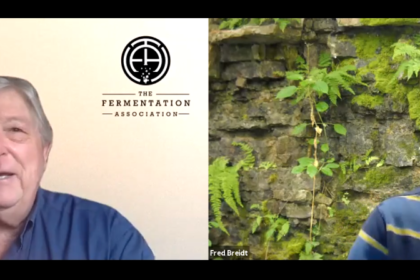
Just because vegetables were fermented does not make them immune to harmful bacteria like E. coli. Though fermentation improves food safety, the quality of the raw vegetable before it’s fermented is extremely important.
“The issue of fermentation safety is one that comes up a lot. People are getting excited about the fermentation world these days, fermentation is increasing in popularity…(but) the wheels can fall off if you’re not careful,” says Fred Breidt, PhD, a USDA microbiologist. Breidt spoke during a recent webinar hosted by The Fermentation Association, “The Science Behind the Safety of Fermented Vegetables.” “The moral of the story: if the vegetables were safe to eat before you ferment them, they’re going to be safe to eat after you ferment them. If they’re not, you’ve got to ferment them for a long time to make sure they’re safe.”
An outbreak of dangerous bacteria in fermented vegetables, “it’s going to be pretty rare that that happens,” Breidt stresses. But, without proper sanitation protocol and vegetable quality control, pathogenic “bad guys” can flourish, like E. coli, salmonella and listeria. E. coli is more common in vegetables because it’s extremely acid resistant, and can survive for long periods of time at low pH levels and cold temperatures.
“Just washing the surface (of the vegetable) isn’t always going to do the trick,” Breidt says. “You don’t have to eat very much to get sick.”
An E. coli outbreak in kimchi made 230 Korean school children sick in 2013. The children, from seven different schools, all ate fermented kimchi made by the same manufacturer.
“If the folks had eaten the cabbage that this kimchi was made out of, they would have gotten sick as well,” Breidt says. “Was the cabbage improved in the sense of maybe it had fewer E. coli on it because of fermentation? Yes. But there was still enough when this was eaten to make a lot of people sick.”
“You can’t rely on salt for safety is the point,” he adds. “It does encourage the lactic acid bacteria and it helps them grow and it will increase overall the safety of your fermentation.”
David Ehreth, president and founder of Alexander Valley Gourmet, parent company of Sonoma Brinery, moderated the webinar. Ehreth first met Breidt when Sonoma Brinery made a few tons of sauerkraut that became infected with yeast. Ehreth says “I called Ghostbusters, and that’s Fred Breidt.” Though yeast is different from a pathogen like E. coli, Ehreth said Sonoma Brinery has managed to control yeast over the years by careful management of production techniques and improved sanitation methods.
